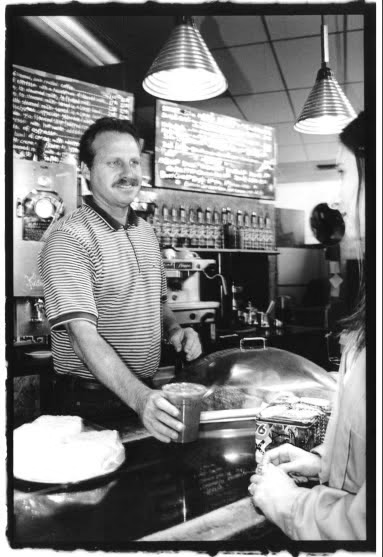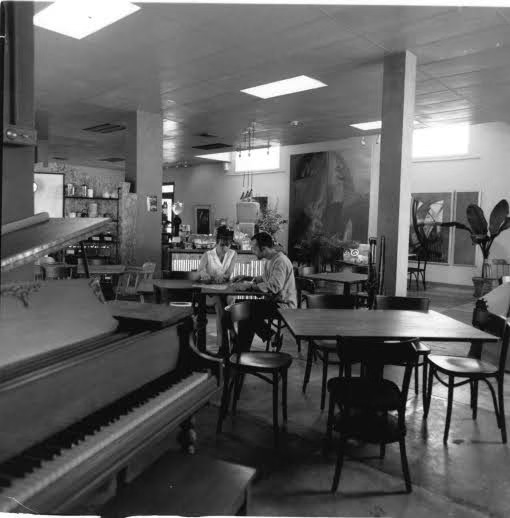
The Evolution of San Pedro’s Coffee Culture
David Lynch is hopeful that he’ll be able to move Sacred Grounds to another space that’s ready-made to move in already. My first encounter with Sacred Grounds was in 2003 when it was still in the 399 W. 6th St. space where Niko’s Pizzeria now resides. The walls were covered with paintings, and shelves with books, and the furnishings felt like someone’s living room. Open mic performances were a regular thing. Sacred Grounds was a space for creativity and expression — a meeting ground for divergent walks of life. At the time, memories of Fifth Street Dick’s, a coffeehouse in Leimert Park were as fresh as a freshly poured roasted brew.
I discovered Fifth Street Dick’s Coffeehouse for myself during my second year at UCLA. Five years after the 1992 Rebellion, Leimert Park was the cultural center of Black Los Angeles, and to tell the truth, I was looking for my own Darius Lovehall moment when I attended my first open mic at the legendary coffeehouse.
Fifth Street Dick’s was a multi-generational meeting ground for artists, creatives and intellectuals and posers and electeds, and regular people of all economic classes.
There’s a reason Leimert Park and Marla Gibb’s Vision Theatre has been a subtext of conversations throughout the renovation efforts of the Warner Grand Theatre. The city mishandled a cultural asset at the center of Black Los Angeles. It still serves as a cautionary tale of what could and can go wrong.
Lynch said he prefers to move Sacred Grounds to a place that’s ready-made to move in.
“I don’t really want to go to an empty space because we did that when we came up here [from the building that Niko’s Pizzeria now occupies at 399 W. 6th]. Then the permitting process is so difficult, and so long. So I’m trying to avoid that,” Lynch said.
Lynch purchased Sacred Grounds from a couple in 1995 and stayed at 399 W. 6th St. until 2005. This was a business venture with partners he had been friends with for a long time.
Lynch described his venture as simply something to do with a business partner friend … almost like, here’s something fun we can do and make some money-kind of situation.
Sacred Grounds moved to its current location in the historic Warner Grand Theater building in September 2005, a smaller space, but one that allowed Lynch to focus on coffee and catering. If there’s a lesson to be learned from Lynch about running a coffeehouse, regardless of one’s subscribed values or vibe and aesthetic a would-be owner would like to achieve, it must be treated as a business.
The city of LA owns the building. So the plan was for Lynch and the gang (Chef Ronald George Tracy and Raul) to move to the space next to the Warner Grand and run the concessions at the theater,which they did for several years, until the end of 2023.
When the Warner Grand renovations are complete, the coffee shop will be a smaller space and whoever takes it over will get to continue the theatre’s concessions stand.
“Then we started doing a lot of catering at Harbor College, which we still do,” Lynch said. This was on top of the filming money they received from productions that have taken place on 6th Street over the years.
“So it’s just everything kind of working together,” Lynch said.
Lynch said this symbiotic relationship with the Warner Grand worked well for Sacred Grounds and was made possible by the great relationship he had with longtime Warner Grand general manager Lee Sweet.
Sweet told Random Lengths in December 2024 that he was sticking with the Warner Grand until renovations were completed sometime in 2026. Lynch said the city’s plans had changed and Sweet was moved to a facility elsewhere.
For better or worse, Sacred Grounds carries a mantle representing community cohesion, freedom of expression, and thought. The first coffeehouse to do that in San Pedro was known as the Golden Ass Coffeehouse founded by Glen and Louise Bye in 1961.
The Eagle Rock Sentinel described that coffee house as “the usual store converted into a big living room with paintings and hi-fi music.” Glen, who was granted an entertainment license by the police commission, said he planned to host lectures, poetry readings and play readings.
The name came from a novel by a Roman-era philosopher and writer, Apuleius. The only surviving Latin novel from antiquity, tells the story of Lucius, a man who is transformed into a donkey and goes through various misadventures before ultimately being restored to human form through the intervention of the goddess Isis.
This likely went over the heads of most people in their time since the old San Pedro News Pilot newspaper didn’t use the name “the Golden Ass” in print, preferring instead to refer to it as the San Pedro coffeehouse.
Less than a year after opening his doors, Los Angeles Police Department Vice Squad detectives arrested Glen over a difference of opinion about a painting of a nude and where the line is drawn between art and obscenity. A police sergeant bought one of the paintings and took it to the city attorney’s office.
The vice squad returned to the coffeehouse, finding several more questionable pictures and a figurine, all the work of artist Konrad Klem. Despite several warnings, the police said, Bye had kept the art objects on display. So a Deputy City Attorney charged Bye with violating the State Penal Code by displaying lewd material. Quoted by the News Pilot, the deputy city attorney wouldn’t speak as an art critic, saying “I don’t know up from down when it comes to art. “One of the women (in artist Klem’s work) had three legs and one picture shows a plant composed of human parts.”
Glen was found guilty and fined $100. The paintings had been on display for three months before he was arrested.
This didn’t seem like a one-off situation for the Byes. From what can be gathered from old news clippings, the Byes were artists and intellectuals desiring to create a safe space for artistic and intellectual expression. Before opening the coffeehouse, Louise regularly hosted lectures on left-leaning ideas and discussions at the YMCA, while Glen was a musician who performed around Los Angeles.
When David Lynch purchased Sacred Grounds in 1995, he desired to make some money while creating community space. The art on the walls, the books on the shelf, and the performance space in the form of a stage in the corner for open mics did that.
It’s not clear how long the Golden Ass Coffeehouse remained open. The point is that coffee house, along with Androcles Book Shop and a hotel on 6th Street, created a space for artists, thinkers and folks who are just off from center to congregate over a cup of coffee. Coffee houses have historically been semi- public spaces for culture and community.
This column and the one in the last edition of Random Lengths are just the first in a series of columns about coffee and coffee houses that will be published monthly for the next several months.
Sacred Grounds is set to close its 468 W. 6th St. doors for good by the end of the second week of April. Lynch said he is still looking for a new space, but he has no idea how that’s going to play out.
But whatever happens, happens.


